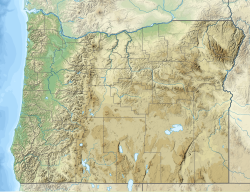| Cusick Mountain | |
|---|---|
 Northwest aspect, beyond Glacier Lake | |
| Highest point | |
| Elevation | 9,518 ft (2,901 m) [1] [2] |
| Prominence | 878 ft (268 m) [2] |
| Parent peak | Eagle Cap (9,577 ft) [3] |
| Isolation | 3.25 mi (5.23 km) [3] |
| Coordinates | 45°08′14″N 117°14′46″W / 45.137285°N 117.246199°W [2] |
| Naming | |
| Etymology | William Conklin Cusick |
| Geography | |
| Location | Eagle Cap Wilderness |
| Country | United States of America |
| State | Oregon |
| County | Wallowa |
| Parent range | Wallowa Mountains |
| Topo map | USGS Aneroid Mountain |
| Geology | |
| Type of rock | basaltic, granitic |
Cusick Mountain is a summit located in Wallowa County, Oregon, US. [4]
Description
Cusick Mountain is located at the center of the Wallowa Mountains and is set within the Eagle Cap Wilderness, on land managed by Wallowa–Whitman National Forest. [2] The remote 9,518-foot elevation (2,901 m) peak ranks as the 17th-highest mountain in Oregon. [3] The peak is situated 2.6 miles southeast of Glacier Peak and 3.3 miles southeast of Eagle Cap which is the nearest higher neighbor. [2] Precipitation runoff from the mountain's north slope drains into headwaters of the West Fork Wallowa River, and all other slopes into headwaters of the Imnaha River. Topographic relief is significant as the summit rises 2,900 feet (880 meters) above South Fork Imnaha River in 1.5 mile. The summit is composed of Columbia River basalt which overlays limestone and Mesozoic granodiorite of the Wallowa Batholith. [5] A limber pine growing at the 8,000-foot level on the mountain's southeast slope is likely the oldest living thing in Oregon and ranks third in the limber pine size category in the United States. [6] [5]
Etymology
This landform's toponym was proposed by Willard Webster Eggleston and officially adopted May 1, 1929, by the United States Board on Geographic Names to remember William Conklin Cusick (1842–1922), an Oregonian and pioneer botanist who specialized in the flora of the Pacific Northwest and in particular the Wallowas and Blue Mountains. [7] The resident of Union, Oregon, made the first botanical studies of the Wallowas by collecting and classifying plants from 1896 through 1910. [8] There are numerous plants with scientific names ending with cusickii which are named in his honor. [7]
Climate
Based on the Köppen climate classification, Cusick Mountain is located in a subarctic climate zone characterized by long, usually very cold winters, and mild summers. [9] Winter temperatures can drop below −10 °F with wind chill factors below −20 °F. Most precipitation in the area is caused by orographic lift. Thunderstorms are common in the summer.

See also
References
- ^ United States Geological Survey topographical map - Aneroid Mountain
- ^ a b c d e "Cusick Mountain, Oregon". Peakbagger.com. Retrieved October 8, 2022.
- ^ a b c "Cusick Mountain - 9,518' OR". listsofjohn.com. Retrieved October 8, 2022.
- ^ "Cusick Mountain". Geographic Names Information System. United States Geological Survey, United States Department of the Interior. Retrieved October 8, 2022.
- ^ a b Terry Richard, Ancient limber pine, likely Oregon's oldest living tree, draws twin brothers to Wallowas quest, Oregonlive.com, September 24, 2012
- ^ Kathleen Ellyn, Majestic monarch clings to life in Eagle Cap, Wallowa County Chieftain, December 13, 2018
- ^ a b United States Board on Geographic Names (1929), Decisions on Names in the United States, Department of the Interior, p. 1
- ^ Jon M. Skovlin (2000), Interpreting Landscape Change in High Mountains of Northeastern Oregon from Long-term Repeat Photography, U.S. Department of Agriculture, Forest Service, Pacific Northwest Research Station, p. 1
- ^ Peel, M. C.; Finlayson, B. L.; McMahon, T. A. (2007). "Updated world map of the Köppen−Geiger climate classification". Hydrol. Earth Syst. Sci. 11: 1633–1644. ISSN 1027-5606.
External links
- Weather forecast: Cusick Mountain
- William Conklin Cusick (photo): Oregonencyclopedia.org

